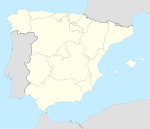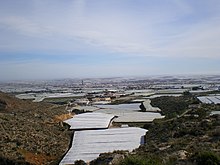El ejido
| El Ejido municipality | ||
|---|---|---|
| coat of arms | Map of Spain | |

|
|
|
| Basic data | ||
| Autonomous Community : | Andalusia | |
| Province : | Almeria | |
| Coordinates | 36 ° 46 ′ N , 2 ° 49 ′ W | |
| Height : | 80 msnm | |
| Area : | 227 km² | |
| Residents : | 83,594 (Jan 1, 2019) | |
| Population density : | 368.26 inhabitants / km² | |
| Postal code : | 04700 | |
| Municipality number ( INE ): | 04902 | |
| administration | ||
| Website : | www.elejido.es | |
El Ejido is a Spanish city in the autonomous region of Andalusia in southern Spain . It belongs to the province of Almería and is characterized by the cultivation of vegetables in greenhouses. The city is one of the richest in Spain. Social tensions exist between the native Andalusians and Moroccan guest workers .
geography
The area around El Ejido in southern Spain resembles a barren and stony desert , but beneath the earth lies a system of subterranean rivers with millennia-old groundwater . There are also important factors such as soil moisture , microthermics and resistance to salinization .
Agribusiness
The geological conditions were the trigger for years of growing vegetables.
El Ejido is Europe's largest "winter garden" used for agricultural purposes. Many types of vegetables are grown in El Ejido, and a large part of the population is dependent on vegetable cultivation, which has led to a certain degree of prosperity. This is not least due to the low wage costs. Many refugees work without papers for an hourly wage below the tariff . The greenhouses used for cultivation cover a large area on land; a total of around 36,000 hectares are covered with plastic, which has earned the region the nickname “mar del plástico” (German: plastic sea). It is the world's largest under foil cultivation area. Around 3 million tons of greenhouse vegetables are produced every year.
Due to the huge amount of land and water used and the large amounts of pesticides used , the ecological situation is very bad. The groundwater is partially polluted.
history
With the construction of the first greenhouse in the 1960s, the systematic use of the plain and the planting of various types of vegetables began. The state encouraged this development. As a result, the city has grown haphazardly in recent decades. The greenhouses were mostly built by hand because there was a lack of money.
In the 1980s, part of the vegetable gardening was managed by foreign speculators , but these companies failed to make large profits and eventually went bankrupt . Even large estates could be in El Ejido not enforce. Later on, as a result of the oversaturation of the European market , the agricultural companies were faced with increasing competition from Morocco . Their prosperity is threatened by even cheaper competition: Vegetables from Morocco - whether this is effective depends on EC import regulations . The first land sales took place around 2005.
economy
The maintenance of the fields and the irrigation system requires constant care, which is time-consuming and expensive.
Most of the harvest is bought by grocery chains at low purchase prices. More than half of the harvest is exported to Germany and other Western European countries by truck. The small town of El Ejido had a very large stand at the Fruit Logistica trade fair in Berlin in 2004 .
Around 90,000 workers are required in the greenhouses in the El Ejido region. Most of these are now seasonal workers from Morocco, Romania, Bulgaria, Sub-Saharan Africa and Latin America, but also from Poland and the Ukraine, who are assigned to certain regions. About half of them do not have a residence permit . They usually work without an employment contract and pay by the hour. The working and living conditions are extremely tough.
Riots
In February 2000, local residents rioted against Moroccan guest workers after two Moroccans killed three residents of El Ejido. The El Ejido mob burned down Moroccan shops and huts. The office of the women's organization Mujeres Progresistas , which looks after the illegal workers, was also smashed. These women from El Ejido - at that time the organization had 600 members - aroused the strongest aggression: they refuted the popular resentment that women should not venture near Moroccans. The authorities took two days to intervene. After this incident, a law was passed that made the construction of further greenhouses subject to approval. A year after the riots, the Spanish daily newspapers El País and El Mundo published an inventory of the agreements reached the previous year by the government, NGOs and trade unions. According to this, 42 new container accommodations with 300 beds were built as living space 20 km away from El Ejido. A promised bus connection to El Ejido had not yet been implemented. In addition, only two of the five destroyed Moroccan bars could be reopened due to non-compliance with building regulations and objections from neighbors. Compensation was paid to 232 people. Since then, numerous new greenhouses have been built without a permit. In December 2003, on behalf of the European Citizens 'Forum (EBF) and the Confédération paysanne (French farmers' union ), another delegation was sent to El Ejido to investigate developments on site.
literature
- European Citizens' Forum and European Committee for the Defense of Refugees and Guest Workers, CEDRI (Ed.): Anatomy of a Pogrom, e.g. El Ejido. Report by a delegation of European citizens on the racist riots in Andalusia in February 2000 . Europ. Citizens' Forum / CEDRI, Basel 2000, ISBN 3-9522125-0-4 .
Web links
- elejido.org
- Heinz-Jörg Graf: Cheap vitamins. In: Deutschlandfunk broadcast “Background Economy”. May 21, 2006 .
- Land under plastic - modern slavery in the largest winter garden in the world. In: ORF Ö1 . December 11, 2005.
- On cheap vegetables and labor migration - El Ejido, Andalusia, February 2000. In: Wildcat Circular No. 56/57. May 2000, pp. 6-12 .
- Felicity Lawrence: Spain's salad growers are modern-day slaves, say charities. In: The Guardian - International Edition. February 7, 2011 (English).
Individual evidence
- ↑ Cifras oficiales de población resultantes de la revisión del Padrón municipal a 1 de enero . Population statistics from the Instituto Nacional de Estadística (population update).
- ↑ Heinz-Jörg Graf: Cheap vitamins. In: Deutschlandfunk broadcast “Background Economy”. May 21, 2006, accessed April 27, 2019 .
- ^ A b Marina Achenbach: Spain, Almeria region: El Dorado under plastic. In: Friday . February 20, 2004, accessed September 23, 2010 .
- ↑ Gaston Cherry: El Ejido - One year after the pogrom. In: LabourNet Germany . Retrieved September 13, 2016 .
- ↑ Nicholas Bell: The social situation of migrants in the plastic groves of Andalusia remains fatal. In: no-racism.net . March 17, 2004, archived from the original on July 24, 2008 ; accessed on February 27, 2019 .


